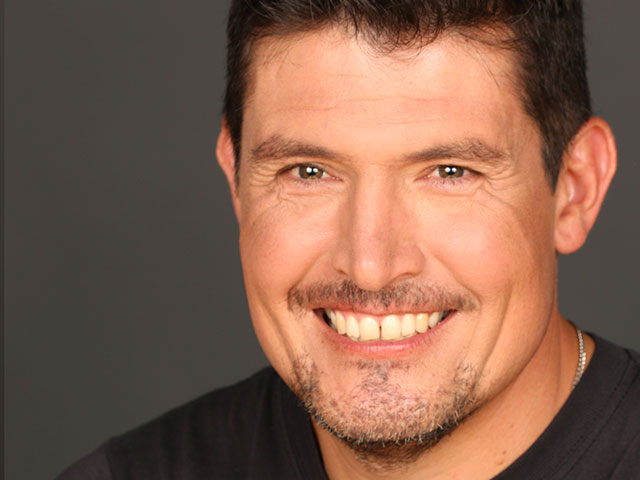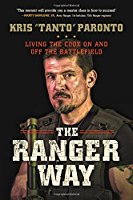Benghazi Hero Lives "The Ranger Way"
THE RANGER WAY
Kris(Tanto) and his team followed a code that made them stronger, more disciplined and more confident as they fought in what is known as The Battle of Benghazi. He says the same principles that helped him succeed as a ranger and private security contractor can help people succeed in everyday life. He recounts his experiences in army infantry basic training, airborne school, Ranger training, and private security contracting and shows how the lessons he learned there are useful for everyone.
One of the most important skills Tanto learned in his military career is developing a battle plan. Planning is important because being prepared is essential to success. Although everything won’t go according to plan, having one enables you do use judgment about things that you can’t control, and adapt when you need to. Tanto says, “Success in a military operation is all about the due diligence. We need to plan, consider alternate timelines, alternate scenarios and often coordinate strategies with others. We have to identify and focus like a laser on all the factors we can control because there are always going to be a bunch of things we can’t.” In Benghazi, having a battle plan was imperative for Tanto and his team. Since they had a plan in place, the team was ready to go five minutes after they were called for duty.
Another fundamental principle that the rangers abide by is making a commitment not to quit. Tanto says, “Ranger School teaches soldiers to endure a situation even when it seems there might be justification to quit.” In fact, Special Ops training is designed to make people quit so that only the most steadfast soldiers remain because you can’t quit in a firefight. The soldiers endure long days and nights, physical and mental harassment, criticism, little food or sleep, and insufferable physical tests. The ones who make it to the end are deemed worthy for battle. It is important to note never quitting isn’t the same thing as never failing. Everyone makes mistakes, but it is crucial to learn from them and continue on.
A third vital skill for battle is leadership. Tanto learned a great deal about leadership in Ranger School, which is training beyond basic training and Airborne School. Whether or not soldiers graduated from Ranger School depended strongly on their efficiency in leadership position in diverse situations. While leading a unit, Tanto was responsible for troops who were tired, hungry, cold and hurting. He says, “Leaders have a clear understanding of their overall mission and the tasks before them. They recognize the strengths and weakness of their team and situation, and they utilize those strengths while minimizing the effect of their vulnerabilities.” A vital lesson in leadership is that “Leaders take the hard right, never the easy wrong.” This means making the right decision not only for yourself, but also for everyone you are responsible for.
Perhaps the most important principle is to have faith. Tanto believes that his faith is what carried him through his entire military career, including Benghazi. “Faith helps me to be fearless,” he said. “It is so much easier to let go of fear or anger and embrace adversity when I accept that my path is the one I am supposed to be on. When the battle in Benghazi started on September 11… I ran toward it because I accepted the fact that God had placed me on the battlefield at that moment.” Tanto knows God protected him that night and continues to do so. He also says faith helps him clarify his values. For instance, in Benghazi, the teams’ leaders told them to stand down even though the ambassador and others were in need of assistance. The team ultimately decided to provide aid without waiting for the Kris Paronto Fact Sheet Page 2 go-ahead. Tanto said, “You know when it is time to stop listening to man’s law and start listening to God’s law. My other teammates might have come at the decision to buck orders differently, but that is how I made my judgment. Having faith helped me know what was right and gave me the strength to take that action.”
THE BATTLE OF BENGHAZI
Kris was one of the six Americans who made up the Annex Security Team. This group of elite warriors had experience in the military and had joined a clandestine organization that protected American covert intelligence operatives overseas. They had come to Benghazi as security officers for American diplomats and CIA agents. The Annex was a 2-acre compound with perimeter walls and multiple houses. It was an ideal base of operations for the US covert intelligence service, especially because of its proximity to the State Department’s Special Mission Compound located a half-mile to the northwest. The Annex housed 20 Americans including the Benghazi CIA base chief and other officers.
Ambassador Stevens, who normally was based at the embassy in Tripoli, planned a 5-day visit to Benghazi starting September 10. As the anniversary of the 9/11 attacks and the Ambassador’s coinciding planned visit approached, several operators recalled an intelligence cable that warned: Be advised, we have reports from locals that a Western facility or US Embassy/Consulate/Government target will be attacked in the next week. As a precaution, the operators moved their tactical gear into their bedrooms in case of battle.
On September 11, 2012, at approximately 9:30 pm, the American diplomatic outpost came under sudden siege by a murderous mob. The attackers rushed in, plundered buildings, and set fires with deadly intent. No friendly troops were close enough to attempt a rescue. State Department security officers took cover and Ambassador Stevens went missing. A call went out from one of the overwhelmed Americans to the security officers at the nearby annex. “If you don’t get here soon, we’re all going to die!” The security team, including Tanto, were about to rely on their past military training (two were Navy SEALs, one was an Army Ranger and three were Marines). They could see from their annex that the State Department was under attack. They put on their gear but had to wait for the go-ahead from the base chief. From their idling vehicles, the operators heard chanting in the distance and orange flames rising from the Compound. Tanto grabbed his radio and asked for a drone and air support. A drone, unbeknownst to Tanto, had been ordered from the US military’s Africa Command to reposition itself over the Compound. Once there, it monitored events and beamed live images to Washington. The request for air support was not easy to fulfill, and later a Pentagon spokesman stated that none of America’s AC-130 gunships were anywhere within range of Benghazi that night. Twenty grueling minutes later, the operators decided to go without approval. Once inside the Compound, the operators, each carrying 40 pounds of weapons, ammo, body armor and equipment, began searching for survivors; they were unable to resuscitate Sean Smith, the State Department’s communications expert, who was found unconscious, and Ambassador Stevens was still missing. No enemy attackers seemed to be on or near the Compound. It was 11 pm.
One of the agents received a phone call warning that large groups of bad guys were regrouping for a second assault. The operators escaped from the Compound to the Annex in their vehicles and some of them made their way to a roof top on one of the buildings. At that time, now after midnight, a reinforcement security team from Tripoli flew to Benghazi on a private charter. (That seven-member force included former Navy SEAL Glen Doherty.) The attackers threw a small jelly bomb over the wall and commenced firing. After the firefight, Tanto thought about his wife and kids. “None of us wants to die. But it’s a possibility and if you don’t accept that, it’s just going to be in the back of your head the whole time, and you’re not going to be able to function. So you accept it, you realize that you’re not going to be able to talk to your family possibly ever again.” He thought back to the amount of time they lost while waiting for the OK to respond to the Compound. He believed Sean Smith wouldn’t have died and Ambassador Stevens wouldn’t be missing had they rushed to the Compound when they were first alerted. (At 2 am, Ambassador Stevens was declared dead.)
Around 3 am, the second firefight ensued. The attackers shot more than they did during the first assault but after about 10 minutes, the attackers retreated without making it to the Americans inside the building. The team of Tripoli operators finally reached the annex. Plans were made for evacuations. Then Tanto heard the strange whooshing sound of incoming fire. The attackers increased their firepower; this time they used mortars. Glen and fellow operator Tyrone Woods, also a former Navy SEAL, didn’t survive after a mortar exploded on the rooftop. When the mortars stopped, the Americans prepared to leave the Annex. They loaded the bodies of Glen and Tyrone onto the truck. At sunrise on September 12, a convoy of armed vehicles left the Annex and escorted the Americans to the airport. The battle had lasted 13 hours. “It’s my hope that Ambassador Stevens, Sean Smith, Glen Doherty and Tyrone Woods will be remembered not as victims or political pawns, but as brave Americans who put themselves in harm’s way, who believed in their work and their country and who died serving others,” says Tanto.
Mentioned in the Video
Guest Info
Author, latest: The Ranger Way: Living the Code On and Of the Battlefield (Hachette Group, 2017)
Was one of six operators who fought the Battle of Benghazi
Contributed to the accounts in Mitchel Zuckoff’s book, 13 Hours, now a major motion picture (Paramount) and available on DVD
Former Blackwater Security Contractor; Worked as part of CIA’s Global Response Staff (GRS)
Former Army Ranger, 75th Ranger Regiment, 1995-2006
Master’s Degree: Criminal Justice
Small Business Owner/Insurance Adjuster
Married, 3 children
Download
High Definition - MP4
High Quality - MP4
Low Bandwidth - MP4





